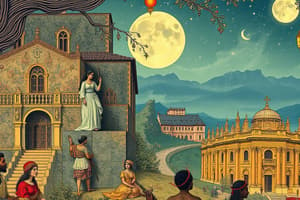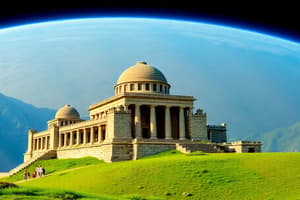Podcast
Questions and Answers
The ______ was a period of great cultural revival in Europe from the 14th to the 17th century.
The ______ was a period of great cultural revival in Europe from the 14th to the 17th century.
Renaissance
The Great Wall is a famous structure built during ancient ______.
The Great Wall is a famous structure built during ancient ______.
China
Julius Caesar was a prominent leader in the Roman ______.
Julius Caesar was a prominent leader in the Roman ______.
Empire
The capital of the USA is ______.
The capital of the USA is ______.
The last Pharaoh of Egypt was ______.
The last Pharaoh of Egypt was ______.
The capital of Brazil is ______.
The capital of Brazil is ______.
The process of testing a scientific idea through experimentation is part of the ______ method.
The process of testing a scientific idea through experimentation is part of the ______ method.
The Sahara is a well-known ______ located in Africa.
The Sahara is a well-known ______ located in Africa.
William Shakespeare is a pivotal figure in ______ literature.
William Shakespeare is a pivotal figure in ______ literature.
Climate change is one of the major ______ issues affecting the world today.
Climate change is one of the major ______ issues affecting the world today.
Study Notes
History
-
Ancient Civilizations:
- Mesopotamia (Sumerians, Akkadians)
- Ancient Egypt (Pharaohs, pyramids)
- Indus Valley Civilization (urban planning)
- Ancient China (Dynasties, Great Wall)
-
Major Events:
- The fall of the Roman Empire (476 AD)
- The Renaissance (14th-17th century)
- World Wars (WWI: 1914-1918, WWII: 1939-1945)
- The Cold War (1947-1991)
-
Important Figures:
- Julius Caesar (Roman general and statesman)
- Cleopatra (Last Pharaoh of Egypt)
- Mahatma Gandhi (Leader of Indian independence)
- Nelson Mandela (Anti-apartheid revolutionary)
Geography
-
Continents:
- Seven continents: Asia, Africa, North America, South America, Antarctica, Europe, Australia
-
Major Countries and Capitals:
- USA – Washington, D.C.
- UK – London
- China – Beijing
- Brazil – Brasília
-
Physical Features:
- Mountain Ranges: Himalayas, Andes, Rockies
- Rivers: Nile, Amazon, Mississippi
- Deserts: Sahara, Gobi, Kalahari
-
Climate Zones:
- Tropical, Temperate, Polar, Arid
Science
-
Branches of Science:
- Physics (laws of motion, energy)
- Chemistry (elements, compounds, reactions)
- Biology (cell theory, evolution, ecosystems)
- Earth Science (geology, meteorology, oceanography)
-
Scientific Method:
- Observation, Hypothesis, Experimentation, Analysis, Conclusion
-
Key Concepts:
- Theory of Evolution (Darwin)
- Laws of Thermodynamics
- DNA Structure (Watson and Crick)
Current Events
-
Global Issues:
- Climate Change (impact and responses)
- COVID-19 Pandemic (vaccination and variants)
- Geopolitical Conflicts (e.g., Ukraine and Russia)
-
Economic Trends:
- Inflation rates (impact on economies)
- Cryptocurrency developments
- Global supply chain issues
-
Technological Advances:
- AI and machine learning
- Renewable energy technologies
- Space exploration (Mars missions, space tourism)
Arts and Literature
-
Major Art Movements:
- Renaissance, Baroque, Impressionism, Modernism
- Notable Artists: Leonardo da Vinci, Vincent van Gogh, Pablo Picasso
-
Literary Genres:
- Fiction (novels, short stories)
- Non-Fiction (biographies, essays)
- Poetry (lyric, narrative, free verse)
-
Influential Authors:
- William Shakespeare (plays, sonnets)
- Jane Austen (social commentary)
- Mark Twain (American literature)
- Gabriel García Márquez (magical realism)
-
Cultural Significance:
- Role of art in society (reflection of culture, social critique)
- Impact of literature on social change (Harper Lee, George Orwell)
History
-
Ancient Civilizations:
- Mesopotamia, home to Sumerians and Akkadians, is often referred to as the "Cradle of Civilization."
- Ancient Egypt, recognized for its pharaohs and monumental pyramids, exemplifies early human engineering and social organization.
- The Indus Valley Civilization is noted for its advanced urban planning and drainage systems.
- Ancient China saw the rise of dynasties, with the Great Wall showcasing its architectural and military endeavors.
-
Major Events:
- The fall of the Roman Empire in 476 AD marked a pivotal transition to the Middle Ages in Europe.
- The Renaissance spanned from the 14th to 17th centuries, igniting a rebirth of art, culture, and intellectualism.
- World War I lasted from 1914 to 1918 and involved many nations leading to significant political changes.
- World War II (1939-1945) was a global conflict that reshaped world alliances and resulted in widespread devastation, followed by the Cold War from 1947 to 1991 marked by ideological battles between superpowers.
-
Important Figures:
- Julius Caesar was a critical figure in Roman history, known for his military prowess and role in the demise of the Roman Republic.
- Cleopatra was the last active pharaoh of Ancient Egypt, known for her political acumen and relationships with Roman leaders.
- Mahatma Gandhi played a crucial role in India's struggle for independence through nonviolent resistance.
- Nelson Mandela was a key anti-apartheid revolutionary who became South Africa's first black president.
Geography
-
Continents:
- Earth comprises seven continents: Asia, Africa, North America, South America, Antarctica, Europe, and Australia, each with unique cultures and ecosystems.
-
Major Countries and Capitals:
- The United States has Washington, D.C. as its capital, while the United Kingdom's capital is London.
- China’s capital is Beijing, and Brazil is home to Brasília, showcasing modern architectural influences.
-
Physical Features:
- Significant mountain ranges include the Himalayas, Andes, and Rockies, crucial for climate and biodiversity.
- Important rivers like the Nile, Amazon, and Mississippi have played significant roles in the development of civilizations.
- Major deserts include the Sahara, Gobi, and Kalahari, affecting regional climates and human habitation.
-
Climate Zones:
- Recognized climate zones include Tropical (warm, humid), Temperate (seasonal), Polar (cold), and Arid (dry), each influencing life and agriculture differently.
Science
-
Branches of Science:
- Physics encompasses the laws of motion and energy, foundational to understanding the universe.
- Chemistry studies elements, compounds, and reactions, essential for various fields including medicine and engineering.
- Biology focuses on cell theory, evolution, and ecosystems, exploring life and its processes.
- Earth Science includes geology (study of Earth’s solid structures), meteorology (weather), and oceanography (oceans).
-
Scientific Method:
- The method consists of systematic steps: Observation, Hypothesis formation, Experimentation, Analysis of data, and Conclusion drawing.
-
Key Concepts:
- The Theory of Evolution, proposed by Darwin, explains the diversity of life through natural selection.
- The Laws of Thermodynamics govern the principles of energy and heat exchange.
- DNA Structure was elucidated by Watson and Crick, laying the groundwork for modern genetics.
Current Events
-
Global Issues:
- Climate Change impacts global weather patterns and ecosystems, prompting international responses and strategies.
- The COVID-19 Pandemic continues to affect health systems and economies, with vaccination efforts varying globally.
- Geopolitical conflicts, exemplified by tensions between Ukraine and Russia, shape international relations.
-
Economic Trends:
- Inflation rates affect purchasing power and economic stability globally.
- Cryptocurrency developments signify a shift in financial paradigms, introducing digital currencies.
- Global supply chain issues have emerged, affecting product availability and pricing.
-
Technological Advances:
- Advances in AI and machine learning are transforming industries and everyday life.
- Renewable energy technologies are pivotal in combating climate change and seeking sustainable solutions.
- Space exploration efforts, including Mars missions and space tourism, expand the boundaries of human knowledge.
Arts and Literature
-
Major Art Movements:
- Notable movements include Renaissance and Baroque, emphasizing humanism and dramatic expression, respectively.
- Impressionism and Modernism challenge traditional perspectives; artists like da Vinci and van Gogh are key figures.
-
Literary Genres:
- Fiction includes novels and short stories, presenting imaginative narratives.
- Non-Fiction encompasses biographies and essays, providing real-life insights and discussions.
- Poetry, in forms like lyric and narrative, conveys emotions and stories through structured verses.
-
Influential Authors:
- William Shakespeare's diverse work in plays and sonnets has affected literature profoundly.
- Jane Austen's works provide critical social commentary on 19th-century England.
- Mark Twain is celebrated for his portrayal of American life and culture.
- Gabriel García Márquez is renowned for his contributions to magical realism, blending the extraordinary with the mundane.
-
Cultural Significance:
- Art serves as a reflection of culture and social critique, influencing societal values and beliefs.
- Literature has historically sparked social change, with authors like Harper Lee and George Orwell addressing crucial issues such as racism and totalitarianism.
Studying That Suits You
Use AI to generate personalized quizzes and flashcards to suit your learning preferences.
Description
Test your knowledge on ancient civilizations, major historical events, and important figures that shaped our world. Explore diverse geographical aspects including continents, countries, capitals, and physical features. Challenge yourself with questions that span across different eras and regions.




